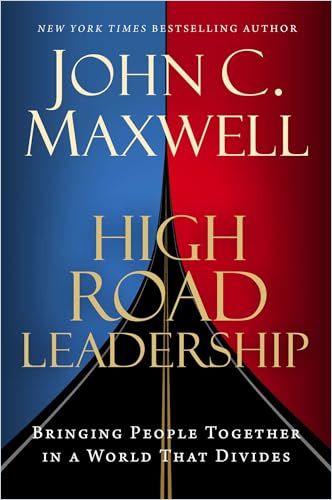Bestselling pastor John C. Maxwell provides uplifting principles for becoming a “high road” leader.

Clear Leadership Basics
Speaker, ordained minister, and prolific bestselling author John C. Maxwell exhorts you to follow core leadership principles and stay true to yourself. His leadership bestsellers include The 21 Irrefutable Laws of Leadership, The Power of Thinking Big, Developing the Leader Within You, How Successful People Think, and many more, all with an overarching theme that is also reflected here: good leaders put their people first.
Superior Leaders
What are your reasons for leading people? Personal gain? Obligation? Duty? Or for the benefit of others? Any answer that doesn’t put your employees’ well-being first will take you off the high road.
Many people – and many leaders – treat their neighbors and colleagues without respect. Good leaders know they can’t build anything worthwhile by treating everyone, including their opponents, as less than humans. Instead, the smartest leaders build bridges and treat people respectfully. They collaborate and work productively with their colleagues, teams, and higher-ups. They recognize that to achieve big goals, they need everyone’s cooperation — not only the cooperation of those with whom they agree.
Empathy emerges when we read and digest opposite perspectives, even when it may feel infuriating.John C. Maxwell
Maxwell’s philosophy, which is reflected in his many books, evokes the general constructs of servant leadership. In this book, he relies on the metaphorical concept of the “low road, the middle road,” and “the high road.” The low road focuses on getting all you can, grabbing what you think the world owes you, and always taking, never sharing. Middle-road leaders share in some ways and regard compromise as their default solution. The middle road falls short due to its transactional nature. People on the middle road keep score, and keeping score never leads to harmony.
“Me first” is the motto of the low road and the middle road. “Others first” is the motto of the high road. High-road leaders give to make sure others get what they need.
Good leaders build connections, not chasms. High-road leaders “go first, give first, serve first, trust first.” They build connections, not chasms, and treat people well, while also providing a model of how everyone should treat others. The high road creates winners without creating losers. And, Maxwell assures you, helping other people also helps you evolve as a leader.
The Right Reasons
Maxwell cites Abraham Lincoln as an example of a high-road leader. He practiced humility and listened to everyone, including his opponents, even though he led during a time of great division and trauma.
Good leaders unite their people by helping them establish common ground and shared goals that give everyone involved a clear, practical way forward. However, Maxwell warns, you should not expect bringing people together to be easy or smooth. Uniting your employees may require considerable time and patience, a vital quality you must develop in order to lead. When you are a high-road leader, you treat your team – and everyone else – with respect and kindness.
Leaders who travel the high road value their people and lead them to take the high road as well. They aren’t negative. They show that they believe in each individual, routinely express favorable opinions of their staff members, and care about those around them without reservation, even — especially — when they don’t reciprocate that regard.
When I see others’ shortcomings, I can see my own shortcomings. I think of my failures as being similar to their failures. I recognize my poor attitude is no better than their poor attitude. We’re all in this together.John C. Maxwell
Your intrinsic attributes as a human being — your individual talents, capabilities, and strengths — are gifts the universe gave you, not qualities you earned. To be a great leader, you must separate your self-worth from your innate abilities — intelligence, athleticism, good looks, and so on. Be proud of what you work for, learn, and earn, not of what the universe gave you.
When you work on this separation, you acknowledge your humanity. After you learn to regard yourself in this more pragmatic, humble, and realistic way, your next step is to emphasize and appreciate the proper choices you’ve made and the effort you’ve expended.
Even high-road leaders can’t win all the time. But they always do the “right things for the right reasons.” In their final analysis, winning or losing is immaterial. For high-road leaders, doing the right thing with the right attitude is what counts. When you find yourself doing something questionable or wrong, examine your motives and make the necessary course corrections. Determining whether your behavior is correct comes down to asking: “What’s right?”
Considering these circumstances, modern leaders must develop their personal “emotional capacity.” This power enables them to respond positively to difficult times, unhappy people, the poor opinion of others, deadlines at work, and any failure to do their best. If you suffer emotional issues, you may face difficulty helping others who suffer similarly. If you see someone in pain or functioning poorly, learn how to assist them. To have a positive influence on others, build and appreciate your own resilience. View yourself with a generous spirit.
Effective leaders are visionary doers. They take action. They prioritize their people over their agenda. Prioritize the objectives and mission you share with the people you lead; put their concerns ahead of your personal and professional goals.
John Maxwell attributes his high-road approach to the example his parents set. His mother was unconditionally loving, but she let him know when he needed to address his mistakes. His father showed him the right way to treat others.
Be Authentic
High-road leaders embrace the right values, learn to live with both success and failure, value character above reputation, own their mistakes, and don’t inflate or deflate their achievements.
High-road leaders take responsibility for their actions, like President Harry Truman, who kept a sign on his desk that read, “The buck stops here.”
I don’t know what your destiny will be, but one thing I do know: The only ones among you who will be really happy are those who have sought and found how to serve.Albert Schweitzer
Great leaders see farther down the road than the average person. They are aware of and acknowledge new developments, often before others recognize those trends. High-road leaders take a big-picture approach and avoid getting mired in messy details and petty conflicts. They see the larger context.High-road leaders “recognize and process” complex situations more quickly than other people.
Great leaders give because giving is the right thing to do.
A direct message
Maxwell’s books on leadership have sold more than 36 million copies, proof that millions of readers in many nations seek out, trust, and treasure his advice. Here, while offering basic practical guidance, he urges you to be a moral, respectful leader who cares about others and brings people together instead of driving them apart. Most of Maxwell’s ideas are basic, sometimes softened into pablum or clichés, and presented with his singular, hugely popular and oddly convincing direct, readable prose. His brand alone moves people to grab his books, which seem designed for readers to skim and quote. And skimming might be the most effective way to read this particular offering from Maxwell, because much of the book is made up of punchy, one-sentence exhortations that linger in the memory.














